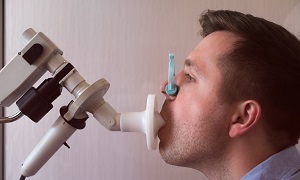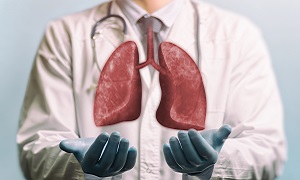Emphysema
Emphysema is a type of chronic obstructive pulmonary disease, which worsens over time and makes it hard to breathe. In this ailment, the air sacs in the lungs lose their elasticity and get enlarged. The alveoli which are located at the end of the bronchioles of the lungs become enlarged due to their walls breaking down or the air sacs getting destroyed, narrowed, stretched, collapsed or over-inflated. Having fewer and larger damaged sacs means a reduced surface area for exchanging oxygen into the blood and carbon dioxide out of it. The damage caused by this ailment is permanent and unfortunately, there is no known way to fully recover from it.
Symptoms
Sometimes people can have emphysema for years without any kind of signs or symptoms. The main symptom of this is shortness of breath, which begins gradually.
Since you might start avoiding activities that cause shortness of breath, you might be not noticing any symptoms, until it begins interfering with daily tasks. It eventually causes shortness of breathing even while one is at rest.
If you are having unexplained shortness of breath for several months, it is important to see a doctor, especially if it is affecting your daily activities and or/getting worse over time. If you are unable to climb stairs due to shortness of breath, your lips or fingernails are turning gray with extortion and you find yourself not mentally alert, then you need to seek medical care immediately.
Causes and risk factors
Usually, long-term exposure to irritants which damages the lungs and the airways is the main cause of emphysema. If you inhale pipe, cigar and other such types of tobacco you are at a greater risk of having emphysema.
Exposure to secondhand smoke, air pollution, chemical fumes as well as dust for your workplace or the environment might also lead to emphysema. Although it is rare, sometimes a genetic condition which is known as alpha-1 ‘antitrypsin deficiency’ can also play a role in causing this ailment.
The risk factors for emphysema include:
- Smoking- Smoking is the first and main risk factor. Nearly three-fourths of people who have this ailment smoke or used to smoke.
- Lung irritants- Long-term exposure to other lung irritants, like secondhand smoke, chemical fumes, etc.
- Genetics- Although rare, alpha-1 antitrypsin deficiency, a genetic condition can sometimes lead to emphysema.
- Age- Most people who have emphysema are at least 40 years of age when they start showing symptoms.
Diagnosis
To diagnose emphysema, your doctor might ask about your medical history and also perform a physical exam. A variety of tests might also be recommended.
Imaging tests
A chest X-ray might help in supporting a diagnosis of advanced emphysema and help in ruling out other causes of shortness of breath. The chest X-ray might also show normal findings if you do have emphysema. Computerized tomography scans combine X-ray images which are taken from various directions to create cross-sectional views of the internal organs. CT scans can help in detecting and diagnosing emphysema. It might also be required if you are a candidate for lung surgery.
Lab tests
Lung function tests
There are other noninvasive tests for measuring how much air your lungs can hold and how well it flows in and out of them. They might also measure how well your lungs deliver oxygen to the bloodstream. A common test is there, which uses a simple instrument known as a spirometer, which you blow into.
Treatment
Even though emphysema is not fully curable, treatments will help in relieving symptoms and slowing the progression of the disease.
Medications
Depending on how severe your symptoms are, your doctor can suggest-
- Bronchodilators: These drugs can help in relieving coughing, shortness of breath as well as breathing problems, by relaxing the constricted airways.
- Antibiotics: If you are having a bacterial infection, such as acute bronchitis or pneumonia, antibiotics are an option.
- Inhaled steroids: Corticosteroid drugs inhaled as aerosol sprays help in reducing inflammation and may also help in relieving shortness of breath.
Therapy
- Pulmonary rehabilitation: A pulmonary rehabilitation program teaches you breathing exercises as well as new techniques that might help in reducing your breathlessness as well as improve your exercising ability.
- Nutrition therapy: Nutrition therapy is where you receive advice regarding nutrition. In the early stages of emphysema, many people need to undergo weight loss, while people going through late-stage emphysema need to gain weight.
- Supplemental oxygen: If you are having severe emphysema with low blood oxygen levels, using oxygen regularly at home as well as when you exercise might provide some relief. There are people who even choose to use oxygen 24 hours a day.
Surgery
If your emphysema is severe, your doctor might be suggesting one or more types of surgery, which includes:
Lung volume reduction surgery
Lung transplantation
Complications
People having emphysema are also more likely to develop:
- Collapsed lung- A collapsed lung can be life-threatening for people who are suffering from severe emphysema, as the function of their lungs has already been compromised. Although uncommon, this is serious when it occurs.
- Heart problems- Emphysema can increase the pressure in the arteries which connect the heart and the lungs. This can lead to a condition called pulmonary, in which a section of the heart weakens after expanding.
- Large holes in the lungs- Some people with emphysema develop empty spaces in the lungs which are known as bullae. They may be as large as half the lung. Along with reducing the amount of space available for the lung to expand, giant bullae can also increase the risk of pneumothorax.







